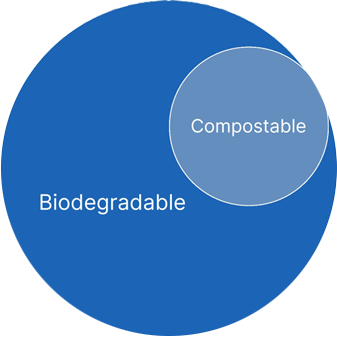2024 UV+EB Degradability Challenge
The RadTech RadLaunch Committee is pleased to announce the 2024 UV+EB Degradability Challenge. This challenge highlights an important pillar of sustainability: designing products with their end-of-life (EOL) in mind. RadLaunch Challenge winners will receive an expenses paid trip to RadTech 2024 in May in Orlando, FL to present their work, as well as cash prizes.
When a product is discarded, it too often ends up contributing to the accumulation of non biodegradable waste in landfills and ecosystems. It is crucial for new technologies and products to prioritize product degradability, rather than add to the ongoing pollution crisis.
We invite applications for innovative submissions across the degradability spectrum and product development chain that utilize UV+EB technology. This includes but is not limited to:
- Degradable raw materials used in the development of UV+EB cure formulations
- Finished products converted with UV+EB that are degradable, such as 3D printed items, consumer electronics, or food packaging
- Formulated UV+EB inks, coatings, adhesives, composites, and 3D printing resins. These items must be degradable themselves and/or not substantially reduce degradability of the substrate on which it is printed
As plastic pollution continues to wreak havoc on global ecosystems, it is crucial to incorporate End Of-Life (EOL) into product design. When a product reaches its EOL, it should ideally be either recycled, composted, or disposed of in a landfill. However, some items may leak from their intended EOL trajectory and end up littering the ground or ocean. With this in mind, applications for the 2024 UV+EB Degradability Challenge must meet one or more of the following degradability standards:
Industrial
Compostable
Physical and chemical breakdown must occur within 180 days in an industrial composting facility and the final product must be non-toxic. Compliant with ASTM 06400, BPI, EN 13432, or TUV Austria OK Industrial Compost certification.
Home
Compostable
Materials must be able to fully decompose into the soil in home composting conditions within a year and the final product must be non-toxic.
Soil
Degradable
Materials must be able to fully disintegrate in an ambient soil environment
Marine
Degradable
Materials must be able physically break down within 3 months and fully biodegrade within 6 months. Compliant with ASTM 06691, TUV Austria OK Biodegradable Marine.
Landfill
Degradable
Materials must be able to fully disintegrate in a landfill environment. Compliant with ASTM 05526.
Biodegradable vs. Compostable
While compostable and biodegradable are often used interchangeably, they have important differences. All compostable items are biodegradable, but not all biodegradable items are compostable. To be certified as compostable, a product must be certified by a 3rd party to completely break down into nutrient-rich compost within a certain amount of time in an industrial composting facility. Given the limited availability of industrial composting facilities, the most sustainable EOL design is soil degradable.
For further information, please see:
Certified Compostable Products: What to Look For and What It Means
BPI Comercial Compostability Certification
Biodegradable or Compostable: What’s the Difference?

A panel of industry experts will judge each application based on the technical innovation and commercial viability of their UV+EB material. All ideas are welcome! Additional prizes may be awarded to outstanding applications that do not reach the full criteria, if applicable.

RadTech International NA
6935 Wisconsin Ave, Suite 207
Chevy Chase, MD 20815
(240) 497-1242
uveb@radtech.org



